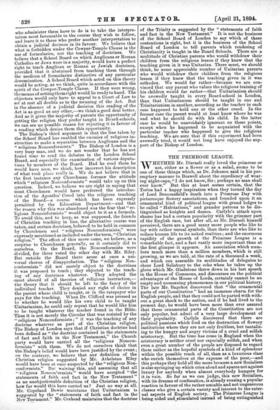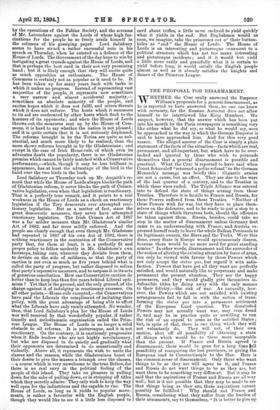THE PRIMROSE LEAGUE.
WHETHER Mr. Disraeli really loved the primrose or not, either as a flower or as a salad, seems to be one of these things which, as Dr. Johnson said in his per- emptory manner to Boswell about the expediency of wear- ing night-caps, "I do not know, Sir ; perhaps no man shall ever know." But this at least seems certain, that the Tories had a happy inspiration when they turned the day of Lord Beaconsfield's death into a Primrose Day with picturesque flowery associations, and founded upon it an ornamental kind of political league with grand lodges to be called "Habitations," and grander patrons to be dis- tinguished as knights and dames. Carlyle's attack upon shams has had a certain popularity with the grimmer part of the English race, but after all, as Mr. Disraeli himself perceived, there are a good many more people who like to toy with rather unreal symbols, than there are who like to reduce human life to its naked realities ; and the enormous rapidity of the growth of the Primrose League is a remarkable fact, and a fact vastly more important than at the first glimpse it appears. An association which num- bers much more than a million members, which is still growing, as we are told, at the rate of a thousand a week, and which can assemble its multitudes of delegates to cheer Lord Salisbury to the echo when he takes up the glove which Mr. Gladstone threw down in his last speech in the House of Commons, and discourses on the political advantages of the House of Lords, certainly cannot be an empty and unmeaning phenomenon in our political history. The late Mr. Bagehot discovered that "the ornamental parts of our Constitution" had an immense charm for the English people, and that they could not be parted with with- out a great shock to the nation, and if he had lived to the present day, he would have been more than ever assured that these ornamental parts of the Constitution are not only popular, but admit of a very large development of their popularity. Carlyle discovered that there are political passions which feed on the destruction of flowery institutions where they are not only fruitless, but tantalis- ing to the hungry and angry victims of a cruel and selfish aristocracy. But the time has come in England when the aristocracy is neither cruel nor especially selfish, and when even a great number of the people are disposed to regard them rather as the hopeful symbols of a kind of splendour within the possible reach of all, than as a luxurious class who enrich themselves at the expense of the poor,—and this perhaps they hold all the more because a new Socialism is also springing up which cries aloud and spares not against luxury for anybody when almost everybody hungers. for it in vain. So far as we can judge, this new Socialism, with its dreams of confiscation, is already rousing a popular reaction in favour of the rather amiable and not ungenerous classes who give a certain variety and interest to the exter- nal aspects of English society. The Primrose League is being aided and stimulated instead of being extinguished by the operations of the Fabian Society, and the screams of Mr. Labouchere against the Lords of whose high fas- cinations for the people he so freely avails himself in the columns of his gossiping paper. Lord Salisbury seems to have struck a rather successful note in his speech on Thursday, when he entered on a defence of the House of Lords. The Government of the day hope to win by instigating a great crusade against the House of Lords, and that is perhaps the best card in their not very promising hand ; but it is likely enough that they will excite quite as much opposition as enthusiasm. The House of Commons is certainly not as popular as it used to be. It has been taken up for many years back with tasks in which it makes no progress. Instead of representing vast majorities of the people, it represents now sometimes a very narrow and almost accidental majority,— sometimes an absolute minority of the people, and excites hopes which it does not fulfil, and utters threats which it does not enforce. The hosts which it summons to its aid are confronted by other hosts which flock to the banners of its opponents ; and when the House of Lords throws out the measures sent up by the House of Com- mons, it is hard to say whether the nation is not pleased ; and it is quite certain that it is not seriously displeased. The reforms brought in by the Tories are quite as sub- stantial, and much more likely to be realised, than the more showy reforms brought in by the Gladstonians ; and except in the case of Irish Home-rule, of which even its advocates doubt the popularity, there is no Gladstonian promise which cannot be fairly matched with a Conservative performance,—which, though it may be less brilliant in appearance, has at least the advantage of the bird in the hand over the two birds in the bush.
Lord Salisbury on Thursday took up Mr. Asquith's re- mark that while the House of Lords always blocks the path of Gladstonian reform, it never blocks the path of Conser- vative legislation, even when that legislation is reactionary. That is a perfectly true remark, and it points to a real weakness in the House of Lords as a check on reactionary legislation if the Tory democrats ever attempted reac- tionary legislation. But as a matter of fact, since the great democratic measures, they never have attempted reactionary legislation. The Irish Crimes Act of 1887 was a far milder measure than Mr. Gladstone's similar Act of 1882, and far more mildly enforced. And the people see clearly enough that even though Mr. Gladstone had repented in 1887 of his own Act of 1882, there is nothing reactionary in the contention of the Conservative party that, for them at least, it is a perfectly fit and proper policy to follow modestly in Mr. Gladstone's own footsteps, taking care, wherever they deviate from them, to deviate on the side of mildness, so that the party of caution is not even so much as five years behind what is called the party of progress, but rather disposed to soften that party's repressive measures, and to surpass it in its acts of generous conciliation. How can Conservative caution do better than to keep less than five years behind Liberal opti- mism? Yet that is the ground, and the only ground, of the charge against it of indulging in reactionary excesses. On all other points,—Home-rule excepted,—the Conservatives have paid the Liberals the compliment of imitating their policy, with the great advantage of being able to effect what the Liberals have only vainly attempted. No wonder, then,,that Lord Salisbury's plea for the House of Lords was well received by that wonderfully popular, if rather tinselly and melodramatic organisation called the Prim- rose League. The House of Lords is no longer a solid obstacle to all reforms. It is picturesque, and it is not reactionary. On the contrary, it is cautiously progressive when it finds leaders who are not highly revolutionary, but who are disposed to do quietly and gradually what their opponents are determined to do sensationally and violently. Above all, it represents the wish to unite the classes and the masses, while the Gladatonians boast of their desire to give the masses a triumph over the classes, —a course which is very unwelcome to the true Briton, for there is no real envy in the political feeling cf the people of this island. They take no pleasure in pulling down for the sake of pulling down, or in stripping off titles which they secretly admire. They only wish to keep the way well open for the industrious and the capable to rise. The House of Lords, so long as it yields to popular move- ments, is rather a favourite with the English people, though they would like to see it a little less-disposed to cavil about trifles, a little more inclined to yield quickly what it yields in the end. But Englishmen would as soon, we imagine, take the primroses out of their button- holes as " end " the House of LorcIF. The House of Lords is an interesting and picturesque ornament to a political structure which has not too many interesting and picturesque incidents ; and if it would but yield a little more easily and gracefully what it is certain to yield before long, it would satisfy the English people almost as well as it already satisfies the knights and dames of the Primrose League.



































 Previous page
Previous page